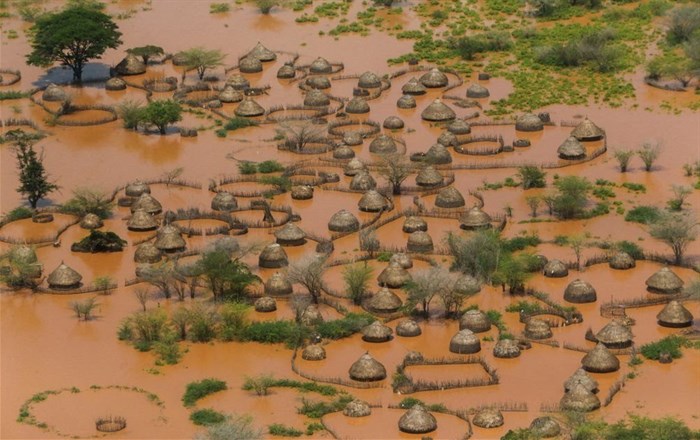Emerging countries will pay a record $400bn to service external debt this year, and 47 of them cannot spend the money they need for climate adaptation and sustainable development without risking default in the next five years, according to a report released on the eve of IMF/World Bank spring meetings.

An aerial view shows a deserted and flooded traditional homestead following heavy rains in Garsen, Tana Delta within Tana River county, Kenya 23 November 2023. Reuters/Thomas Mukoya/File Photo
The report from the Debt Relief for Green and Inclusive Recovery Project (DRGR) found that the 47 developing countries would hit external debt insolvency thresholds, as defined by the International Monetary Fund (IMF), in the next five years if they invested the necessary amounts to hit 2030 Agenda and Paris Agreement goals.
"They would be in such high debt distress that they would be knocking on the door of (default), given the current debt environment, if they were going to try to mobilise that kind of financing," said Kevin Gallagher, director of Boston University's Global Development Policy Center, which led the project.
Many of the at-risk countries are in Africa, including Senegal, Nigeria and Kenya.
A further 19 developing countries lack the liquidity to meet the spending targets without help, though they would not approach default thresholds.
The report called for an overhaul of the global financial architecture, alongside debt forgiveness for the most at-risk countries and an increase in affordable finance and credit enhancements.
Martin Sokol and Jennie C. Stephens 12 Jan 2024 "We need to mobilise more capital and bend down the cost of capital for countries if we're going to have any prayer to meet this," Gallagher told Reuters.
The DRGR Project is a collaboration between the Boston University Global Development Policy Center, Germany's Heinrich-Böll-Stiftung, and the Centre for Sustainable Finance at the University of London's School of Oriental and African Studies (SOAS).
The report also presses the International Monetary Fund to rejig the way it calculates debt sustainability: arcane-sounding assessments that are crucial to determining how much debt relief countries in default get.
If the amount of debt that the IMF determines a country can handle is too high, it be saddled with unaffordable payments that could push it back into default.
Private creditors, however, have at times criticised the Fund's analyses for being too pessimistic, making them closely watched and politically charged.
The DRGR says the IMF, which is conducting a years-long review of the analyses, must incorporate climate spending needs, as well as buffers to cover shocks ranging from climate catastrophes to economic crises to pandemics.
"If the international community does not act in a swift and uniform manner to provide comprehensive debt relief where needed alongside new liquidity, grants and concessional development finance, the costs of inaction will be exorbitant," the report warned.






































